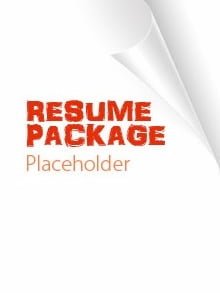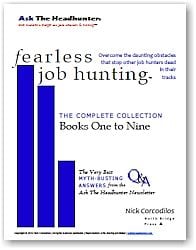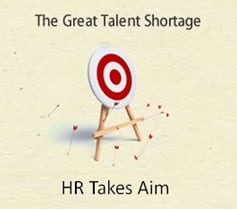In the July 2, 2013 Ask The Headhunter Newsletter, a reader asks whether employers hire 64 year olds:
I really enjoyed reading Too Old to Rock & Roll? My husband has great knowledge and is good at what he does. He is 64, confident and looks great.
He just interviewed, they liked him, and asked him to fill out an application. The first line asked for his date of birth. Employers can’t discriminate, but can think he’s too old and give a bogus reason for not hiring. Do you know of applicants who were hired at 64, or do you personally think that he is too old to seek employment?
Nick’s Reply
We recently heard from a 58-year-old who landed a new job. But your husband is in his sixties. I can offer you two things: Evidence that people in their sixties can get jobs. And methods to do it.
Consider this series of e-mails I received over an eight year period from a long-time subscriber, Stephanie Hunter.
June 29, 2004 I have faced the job search at an advanced age and successfully defeated the age anxiety. I am a 63-year old woman, nothing special, with an M. A. in English and twenty years of progressive experience in public relations. I was suddenly outsourced from a job I loved and intended to retire from. After nine months of researching companies, training myself in the Ask The Headhunter methods, and working hard to do the job in the interview, I have — again, at age 63 — been hired into a Fortune 500 company.
I say I am “nothing special” because your readers should know anyone can do it. Often when I hear some phenomenal success story I look for the silver spoon or the uncle who was in on the ground floor, but I did this myself. With a little encouragement and a lot of help from your advice. Glad I discovered you. I will continue to read your e-mail newsletter and pass along your tips to my job-searching friends. There are plenty of them out there. Thanks.
March 14, 2006 Good morning Mr. Corcodilos: Just to let you know I found myself in your newsletter this morning (only now I am two years older!). I’ve received excellent reviews, one merit raise and — most important to me — serious job satisfaction. Thanks again for the timely and timeless advice; I read the newsletter every week and often forward sections of it.
September 11, 2007 Re: your piece today about age. Three years ago I wrote to tell you your work had inspired me to keep going and do it right. At age 66 I am still on the job, enjoying it and regularly taking on new responsibilities. Keep up the good work; no one in the business does it as well as you!
January 15, 2013 All is very well. I remain in the job we discussed; I have served for eight+ years, and my most recent review was “O” for outstanding plus a 4% raise. It’s too good to make up, and I thank my luck almost daily. Quick arithmetic will give you my current age, but there is one person on a staff of 200 who is, um, older than I!
Although I am not in the job market myself, I still pass along your new information and techniques to folks who are.
Stephanie Hunter is unusual only because she got in the door and turned her meeting into The New Interview.
I don’t think anyone is too old for employment if they can contribute to the bottom line. And I know companies that hire older workers for what they can do. Needless to say, I also know companies that discriminate and break the law. But I don’t think we can live our lives worrying what someone else’s motives are — being fearful leads to failure. Our challenge is always to inspire motives in others that enable us to achieve our own goals. That’s Fearless Job Hunting.
Your husband’s job is to inspire the belief that he will contribute to a company’s bottom line more than that he will pose a risk. Or he can collect evidence to sue for discrimination, or he can get depressed and give up and complain. He might win a suit in time, but there is no quarter in the latter.
Or, he could try this to get in the door, and to motivate an employer:
Excerpted from:
Fearless Job Hunting Book 3: Get in The Door (way ahead of your competition)
Don’t stop at the resume.
When the resume you send to a company is added to a big stack, your odds of success drop precipitously due to competition. Managers act first on information they receive directly from trusted sources, like co-workers, friends and experts they pay for help… Your resume isn’t sufficient.Scope the community.
Every community has a structure and rules of navigation. Figure this out by circulating. Go to a party. Go to a professional conference or training program. Attend cultural and social events that require milling around with other people… The glue that holds industries together includes lawyers, accountants, bankers, real estate brokers, printers, caterers and janitors. Use these contacts to identify members of the community you want to join, and start hanging out with them.Meet the players and participate.
Use the social geography we just discussed to figure out the lay of the land in your industry. Which companies do business with which others? What people circulate between related companies as employees, as vendors and customers, and as consultants? Then go to professional events armed with this information, which will make you a better participant.Ask for help.
Once you have established yourself as a member of a relevant community, gently ask for help. Gently. Never ask for a job or a job lead. Ask for introductions to people who can help you fill in the gaps in your knowledge about a company’s (or industry’s) business.Have something useful to say.
Produce a brief business plan describing the work you will do to make a company more profitable. Now, you could put that plan into a resume and send it along. Or, you could discuss it with a person who will talk to his friend the manager about you… It’s the people, Stupid… To get in the door, you need those people to introduce you. And the manager needs someone who has a plan to get the job done. Make that person you.
Do you know anyone in their sixties (or even seventies) who has been hired or who is still happily delivering value in their job? What’s your story? Regardless of your age, what methods have you used to get in the door?
: :












